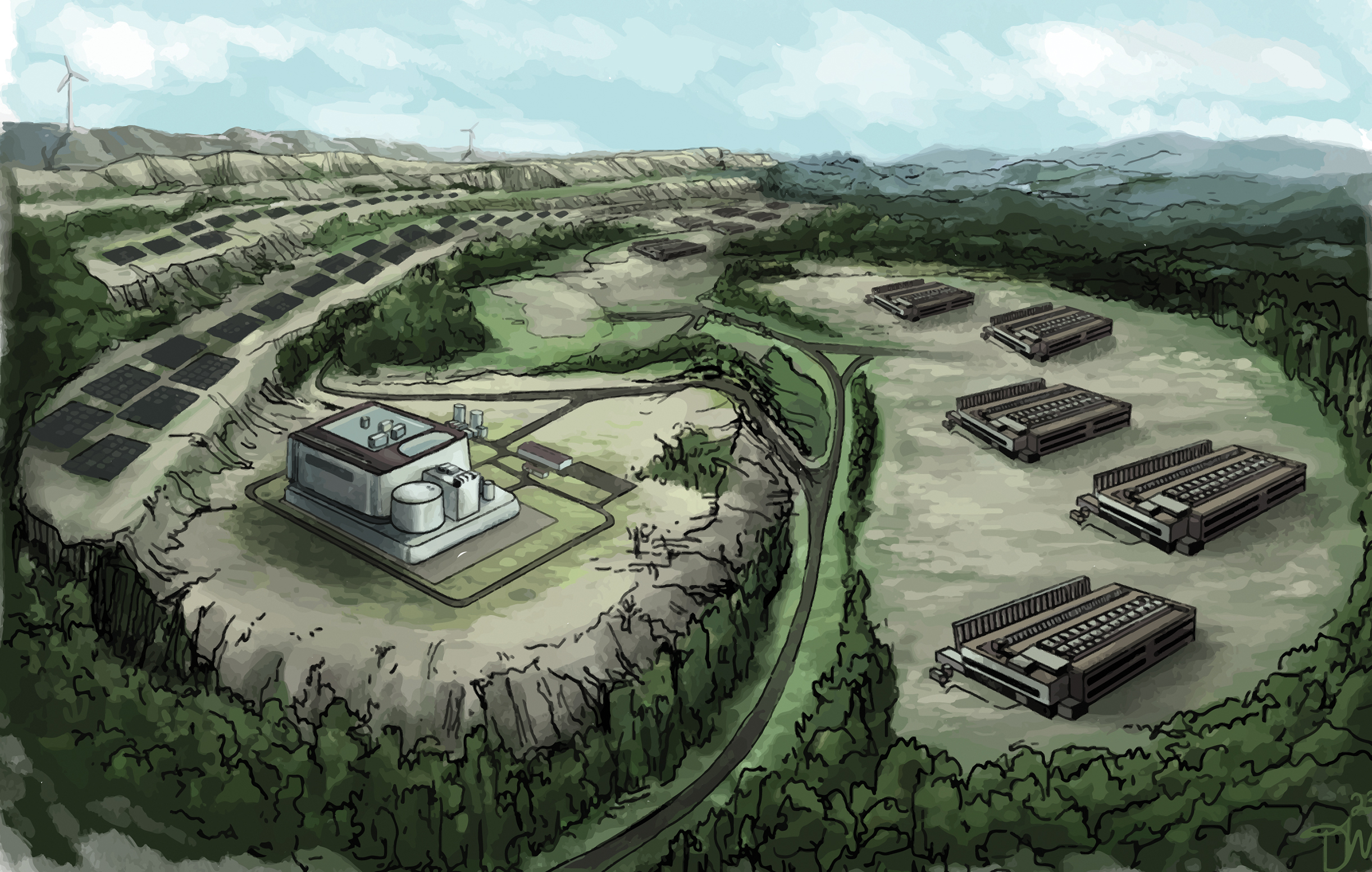A Hub for Energy Research in Southwest Virginia
In a region where coal once dominated, the Energy DELTA Lab will be a proving ground for clean energy advancements
His hair and mustache grayed, 74-year-old Mike Quillen is no longer flexible enough to regularly walk the mines of Southwest Virginia, where he started a career that saw him build a company that became the sixth-largest coal supplier in the world — although he does plan to be underground for his 75th birthday.
But while his joints show their age, Quillen’s mind remains nimble, a quality that made him a natural choice to chair the Energy DELTA Lab, a Wise County partnership between local and state leaders aimed at establishing the region as a testbed for energy innovation.
Those aspirations achieved liftoff in October when the lab reached a landmark public-private deal to use 65,000 acres of previously mined coal properties to develop clean and sustainable power.
The agreement brings together the Energy DELTA Lab, Wise County, Virginia officials, and landowner Energy Transfer. The land empowers the Energy DELTA Lab to become a green energy matchmaker, pairing the land with developers who can build and store cleaner, more sustainable sources of energy to power the Commonwealth and its economy.
Some deals will be made in 2024, said Will Clear, managing partner of Bristol-based Virginia Energy Strategies, former chief deputy director of the Virginia Department of Energy, and an adviser to the lab. “I’m very excited. That’s when we get to see some traction to getting real assets on the ground,” he said.
A Plot of Land and a Vision
That vision, five years in the works, garnered public attention in 2022 as a piece of Virginia’s revamped 2022 Energy Plan, itself a refinement of the Virginia Clean Economy Act of 2020. Since then, leaders at the Energy DELTA Lab secured the one asset without which the project couldn’t move ahead — land that would make possible plans to develop diverse projects that include solar, wind, nuclear, hydrogen, and energy storage.
“Everything rides on this land,” said Will Payne, managing partner of economic development firm Coalfield Strategies and an adviser to the Energy DELTA Lab.
The size of the land, nearly the equivalent of 50,000 football fields, provides the space the lab needs to make good on its promise. “This acreage will provide everything we need at DELTA Lab for the pending projects we’ve got in the pipeline right now,” Clear said.
Size matters. So, too, does the fact that the land and all the rights bundled with it are owned by Energy Transfer, which has a network of pipelines and energy assets in 41 states. That sole ownership is unusual for a region in which it was often more expedient to sell off property ownership piecemeal — whether that meant the right to sell timber, lay railroad tracks, or mine minerals underneath.
“They are unique in that,” Quillen said.
Quillen, too, brings an unusual perspective to his role. Growing up in Gate City near the Tennessee border, he first worked in the coal industry for a small company his father co-owned. Along the way, to become a foreman, he had to work two years underground in the mines. Eventually, he became president of Paramont Coal.
In 2002, Quillen dove deeper at a time the industry was struggling, helping to found coal producer Alpha Natural Resources. In a sector that saw waves of mergers and acquisitions, Alpha grew quickly. By 2012, when he stepped down as its chairman, Alpha was the second-largest coal producer by revenue in the United States.
In the years since, the rise of natural gas — buoyed by advances in extraction techniques — and the push for a shift to renewable energy sources led to a significant decline in U.S. coal-fired power generation, and thousands of related jobs were eliminated in Southwest Virginia. The leaders behind the Energy DELTA Lab asked Quillen to chair their board and play a role in building a new economy off the infrastructure of the old. It was an offer the former miner couldn’t resist.
The goal is to keep the region going for another 50 years.
“I don’t play much golf. I don’t go to Florida,” Quillen said. “I spend most of my time trying to help the region move into that next transition so the next generation can stay here. The goal is to keep the region going for another 50 years.”
The lab has a good partner in Penn Virginia Operating Co., which manages the lands here for landowner Energy Transfer as a wholly owned subsidiary and has a history in the region that dates back more than a century.
A Place for Innovation
Quillen’s outlook represents a shift in the Energy DELTA Lab’s goals. The lab’s initial concept was designed by Dr. Michael Karmis, former director of the Virginia Center for Coal and Energy Research. Karmis conceived of the lab as a center for research and an incubator for innovation, which was reflected in his choice of the name DELTA, an acronym for Discovery, Education, Learning, & Technology Accelerator.
While Karmis’ goals remain, the site has features that have also made it a magnet to developers. The former mining area is already served by roads and power transmission lines. There are also fewer regulatory restrictions on how the land can be repurposed.
But it’s the underground mines themselves, once thought of as a liability, which may be the site’s biggest attraction. They contain cool water that can be used to operate one of the most promising sectors in the regional economy: data centers.
With “Data Center Alley” in Loudoun County, Virginia already has the highest concentration of data centers in the world, but high demand, land prices, and energy and cooling needs mean that the industry needs to expand into new areas. The Energy DELTA Lab will build Data Center Ridge, where the equipment can be cooled with billions of gallons of water collected from the underground mines, realizing savings of more than $1 million annually and creating a competitive edge in a fast-growing sector.
Data Center Ridge could then be powered by a multitude of on-site energy generators, including blue hydrogen, solar, wind, hydro pumping stations, and, eventually, small modular nuclear reactors.
“It’s going to transform the region,” Payne said.
Inside the Energy DELTA Lab’s Future Projects
In addition to Data Center Ridge, the Energy DELTA Lab is working on numerous other projects aimed at developing clean energy sources:
- WIND: Erect wind turbines that generate 225 megawatts (MW) of power with a goal of eventually doubling output. Required studies on wind speed and other factors could be completed as early as 2025, after which construction would begin.
- SOLAR: Create solar farms that produce 300 MW of power with the goal of having them in place as soon as 2028, with the potential of adding more than 400 additional MW.
- NUCLEAR: Build small modular reactors to provide a steady source of energy to complement intermittent sources, like wind and solar, and serve as a bridge while technology is developed to store intermittent energy efficiently on a large scale. Though developers have visited the site, potential deals are likely years away as companies test competing designs.
- PUMPED-STORAGE HYDRO: Known as Project Energizer at the Energy DELTA Lab, this effort will use underground mine reservoirs as sources of water. When energy supply exceeds demand, the water will be pumped to higher-elevation reservoirs to allow it to be used to generate power during demand surges.
- ENERGY STORAGE: Test and deploy innovative ways to store power, such as cutting-edge batteries. The Energy DELTA Lab is partnering with technology accelerator Newlab and international energy developer Ørsted on the project.
- HYDROGEN: Generate hydrogen energy that can be used to power vehicles, trains, and boats by separating the hydrogen from water. To separate hydrogen, heat must be applied — initially using natural gas, producing what is called “blue hydrogen.” As cleaner power sources go online, generation would shift to sources like wind and solar, creating “green hydrogen.”
- EDUCATION: Provide scientific assistance to energy innovators and educational opportunities for area K-12 schools and community colleges looking to train the next generation of talent to work in energy production in Southwest Virginia.
- PARTNERSHIPS: Continue the strong relationship with area utilities Dominion Energy and Appalachian Power, which have proven instrumental in growing the scope of the lab beyond research to commercialization and deployment.





